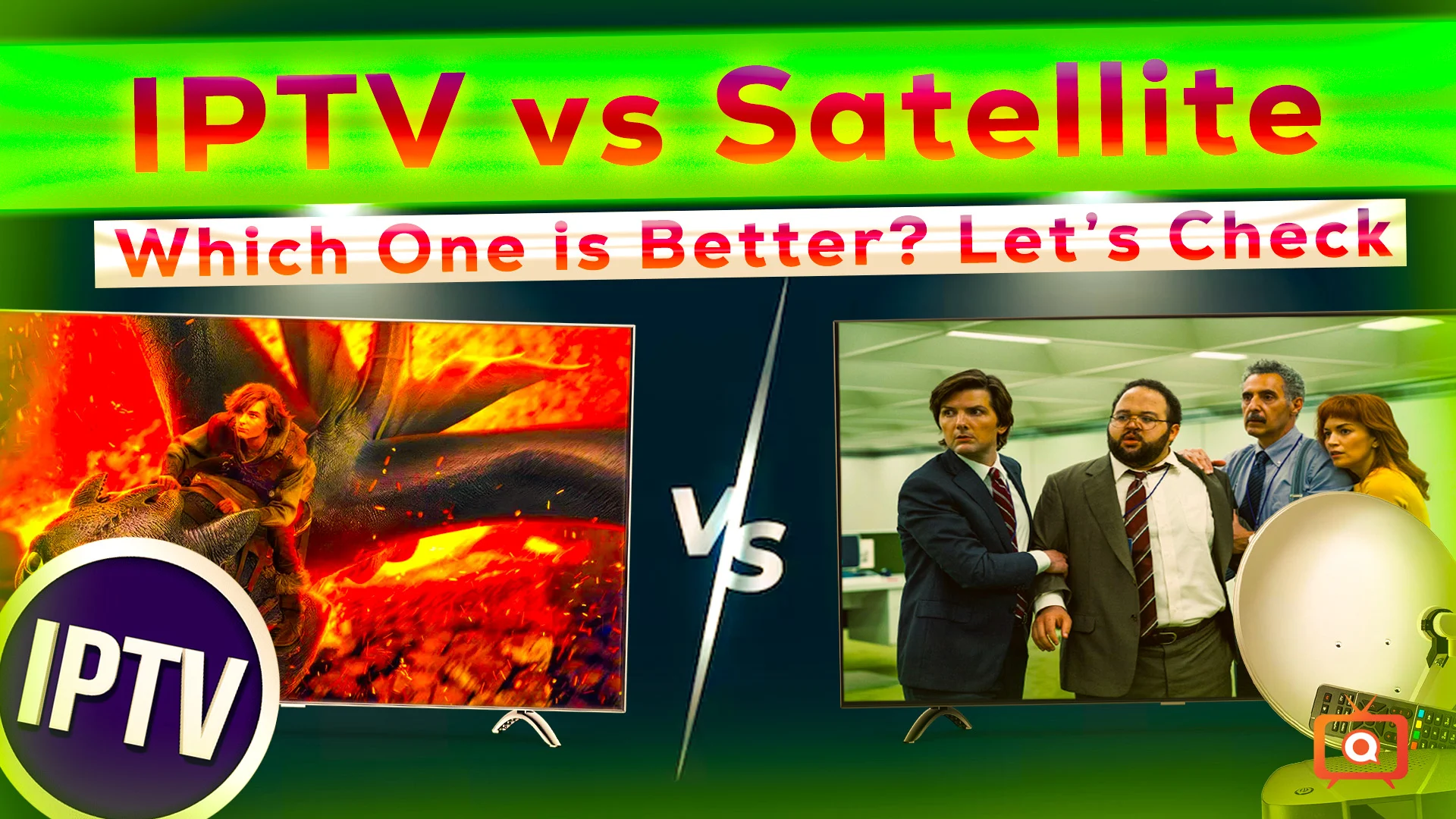In the new era of live streaming, viewers have an abundance of options to enjoy TV programs. However, two options are the most popular among them – Internet TV vs Satellite TV. Yes, both technologies will allow you to access a massive number of TV channels and video-on-demand (VOD) content, but they practically function in different ways.
Now, the question is between IPTV vs Satellite TV– which one is better? Which one should you pick? In this article, I’ll have an in-depth discussion on IPTV vs Satellite TV– the ultimate showdown, along with other topics such as key understandings, how they work, pros and cons, etc.
Continue reading to the end to understand the differences between IPTV and Satellite TV, enabling you to make an informed decision. Let’s go –
| Critical Facts + Both Internet Protocol Television and satellite TV use unique technologies to broadcast TV programs, PPV (Pay-Per-View) events, and on-demand content like movies, binge-worthy TV shows, documentaries, anime, etc. + Satellite TVs rely on geostationary communication satellites to transmit television programming. Conversely, the TV over broadband requires the internet to operate. + IPTV is technologically ahead and provides much affordable and high-quality streaming than its counterpart. + Satellite TVs are still important in rural areas where 4G or 5G internet is not widely available. |
Understanding IPTV: What It Is and How It Functions
Internet Protocol Television(IPTV) is a digital way of entertainment. It uses the internet to deliver television content to viewers, replacing traditional methods like cables or satellites. People can now enjoy TV channels, movies, shows, live events, etc., online.
Internet TVs can be watched through various devices, including Smart TVs (Hisense, Samsung, Sharp), Fire TV Stick, MAGbox, Roku, smartphones, tablets, phablets, Windows PCs and laptops, Apple TV, etc.

Some of the best examples of IPTVs are Mom IPTV, Propack IPTV, Twit IPTV, Sling TV, Hulu+, fuboTV, YouTube+, etc. Moreover, you’ll need an IPTV player or app to run the content.
Some IPTV services offer advanced features, including multi-device streaming, extensive VOD libraries, a TV Guide, and cloud DVR — features that are not always available on satellite.
Satellite TV Explained: What It Is and How It Operates
Satellite television uses communication satellites orbiting the Earth to beam TV signals to a satellite dish installed at the user’s location. This entire process happens in seconds, delivering high-quality digital or HD content to even the most remote areas — as long as the dish has a clear view of the sky.
Satellite TV operates by sending television signals from ground-based broadcast stations to orbiting satellites in space. These satellites then relay the signals back to Earth, where your home’s satellite dish picks them up.

The dish passes the signal to a receiver or set-top box, which decodes the content and displays it on your television.
This technology supports a wide range of programming, including standard and high-definition channels, along with extras like pay-per-view and on-demand services. Some of the best examples of satellite TV services include DISH Network and DirecTV. Since it can work without being online, it’s still very popular in remote regions.
Comparison Between IPTV vs. Satellite TV
| Feature | IPTV | Satellite TV |
| Content Variety | Offers a variety of content, including global channels & events, massive on-demand content, sports packages, etc. | It also provides premium and international channels & content. However, it lacks substantial global or niche content compared to IPTV. |
| Delivery Method | 4G/5G internet | Satellite dish |
| Signal Latency | Very little. It depends on the Internet Service Provider(ISP). If the net is fast enough, you don’t have to worry. | Not too much. But bad weather can have an impact on it. |
| Accessibility | It is accessible through multiple devices simultaneously. So, you can enjoy any content wherever you are. | It needs a satellite dish and receiver to operate. So, it’s not possible to view any content while on the go. |
| Streaming Quality | It offers HD, FHD, 4K, or even 8K streaming. | It provides the highest HD quality. |
| Required Equipment | Streaming device & internet connection. | Dish, receiver, coaxial wiring |
| Flexibility | Offers flexible viewing options, allowing users to choose what to watch through on-demand libraries and catch-up services. | Uses a traditional broadcast model with fixed schedules. DVR may be available, but it lacks the flexibility of IPTV. |
| Cost | Setup is cheaper—just a subscription, an app or media player, and a fast internet connection. The cord-cutting solution is also more affordable and contract-free. | The installation process requires heavy equipment and the cost is also higher than TV over broadband. |
| Geographical Considerations | Thrives in cities and densely populated areas with robust net infrastructure. However, it can face boundaries in faraway regions with restricted internet access. | Suitable for areas where open skies are available. But, can’t stand in big cities since tall buildings limit the satellite signal. |
Benefits and Problems of Internet Protocol TV
| Pros | Cons |
| IPTV provides access to local and international channels, on-demand content, and PPV events. Relying on the internet, it easily streams content from different regions flawlessly. | It needs a highly stable internet connection to operate correctly. Otherwise, buffering and lagging can happen. |
| The versatility of IPTV is on another level. It can seamlessly connect with various devices, including smartphones, smart TVs, gaming consoles, MAG boxes, Roku, Apple & Windows devices, Fire TV Stick, etc. | It doesn’t operate properly in faraway areas where a fast internet connection isn’t available. |
| IPTV offers a vast library of on-demand content, including movies, shows, and documentaries. It removes the need to follow broadcast schedules, giving users full control over what and when they watch. | Legal grey areas for unlicensed IPTV services. |
| The time-shifted media helps users to watch content later (at their flexible time). | |
| A very few commercial breaks – so tension on the fun of watching the content. | |
| The installation procedure is simple and hassle-free. All you need is a compatible device like a PC, a laptop, an Apple TV, a streaming box and a stable internet connection. You’re good to go. | |
| The installation procedure is simple and hassle-free. All you need is a compatible device like a PC, a laptop, an Apple TV, a streaming box, and a stable internet connection. You’re good to go. | |
| IPTV is generally easy to set up. | |
| Internet Protocol TV is a much affordable option. No long-term contract and a full refund is available. |
Benefits and Problems of Satellite TV
| Pros | Cons |
| Satellite TV offers large packages of live TV channels that include premium sports, news, movies, music, international channels, and more. | Heavy storms, snow or windy weather can affect its service. |
Satellite TV offers excellent picture quality. It provides HD and 4K channels. | It doesn’t have any legal restrictions. If you use it, you won’t have to face any legal problems. |
| Satellite TV is beneficial for people in rural areas. | Satellite TV’s price requires heavy equipment to get installed. |
| Offer stable picture resolutions if installed accurately. | |
| In case of emergencies (ex – flood, cyclone), the internet connection can fail (Starlink isn’t yet available everywhere). At that moment, satellite TV can be helpful if appropriately powered. | |
| Since satellite relies on direct-to-home signals, you’re independent of local service outages like cable cuts or regional maintenance. | |
| Consistent pricing. No chance of any hidden costs. | |
| It offers live events in real-time without any delay. | |
| No chance of buffering or lagging since it uses the satellite signal. |
What Equipment is Needed to Install IPTV and Satellite TV?
IPTV Installation
To install Internet TV, you need:
- Reliable internet (minimum 25mbps of speed)
- App or IPTV box
- Simple tasks like plug-and-play, and that’s it.
Satellite TV Installation
Satellite TV installation requires:
- Physical dish installation
- Clear weather and sky
- Specialist assistance is needed
IPTV vs Satellite TV: What the Future Holds for Digital Broadcasting
In this digital era, it’s evident that the TV over Broadband is getting more priority among people than its counterpart. As the television landscape evolves with the advent of the new era, both Internet TV and satellite TV are adapting accordingly.
It’s clear that IPTV is rapidly outpacing satellite TV, thanks to its fully digital, on-demand entertainment experience. With the rise of high-speed internet, the rollout of 5G networks, and innovations like Elon Musk’s Starlink satellite internet, IPTV is becoming the primary choice among the new generation, and IPTV services are also growing in the world.
Furthermore, the high-quality streaming, multi-device compatibility, Electronic Program Guide, intuitive interface, interactive features, cloud DVR, personalized recommendations – everything makes IPTV more attractive.
On the other hand, satellite TVs is rapidly losing its grip on megacities and urban areas. According to IBISWorld, satellite providers are experiencing a decline since digital streaming is gaining popularity, resulting in a 3.1% drop in revenue in the USA market in 2024.
However, it is still popular in rural areas where a fast internet connection is limited. Some satellite providers are shifting toward hybrid models—combining satellite with internet-based features—to stay relevant in the broadcasting market.
Emerging Entertainment Trends That Will Shape the Future
- Increase in Smart Internet TV platforms with AI-powered suggestions.
- Massive expansion of cloud-based viewing.
- Continued decline in traditional satellite-only subscriptions.
- Satellite TV is evolving into IP-based delivery models (e.g., DirecTV Stream). It’s safe to say that this trend will continue since the entire world is shifting toward online entertainment.
Final Verdict: IPTV or Satellite TV?
| Criteria | Winner |
| Cost Efficiency | IPTV |
| Rural Compatibility | Satellite |
| Content Variety | IPTV |
| Live Broadcast Delay (Latency) | Satellite |
| On-Demand Features | IPTV |
| Installation Ease | IPTV |
| Advanced Features | IPTV |
| Personalized Experience | IPTV |
If you’re looking for more reliability, sophisticated features, high-end options, extensive channel listings, VODs, and HD streaming, go for the IPTV.
But, if you’re living in remote areas where the open sky can be seen before seeing a building, Satellite TV is still the boss.
FAQs on What is the Difference Between IPTV and Satellite TV?
Internet Protocol Television itself is legal. But not every IPTV provider is verified and possesses a license to conduct operations. To learn which providers have a license, visit here: Top 5 Legal IPTV Providers (2025 Review).
IPTV delivers its content through the internet, while satellite TV uses a satellite signal to provide entertaining content to people.
IPTV costs around $50-$60 annually, while satellite TV requires a minimum $80. Internet TV is also flexible and has different budget-friendly plans.
Internet TV offers more flexibility, an abundance of content, a personalized viewing experience, HD streaming and other facilities. Satellite TV only thrives in remote areas where internet connection is slow.
